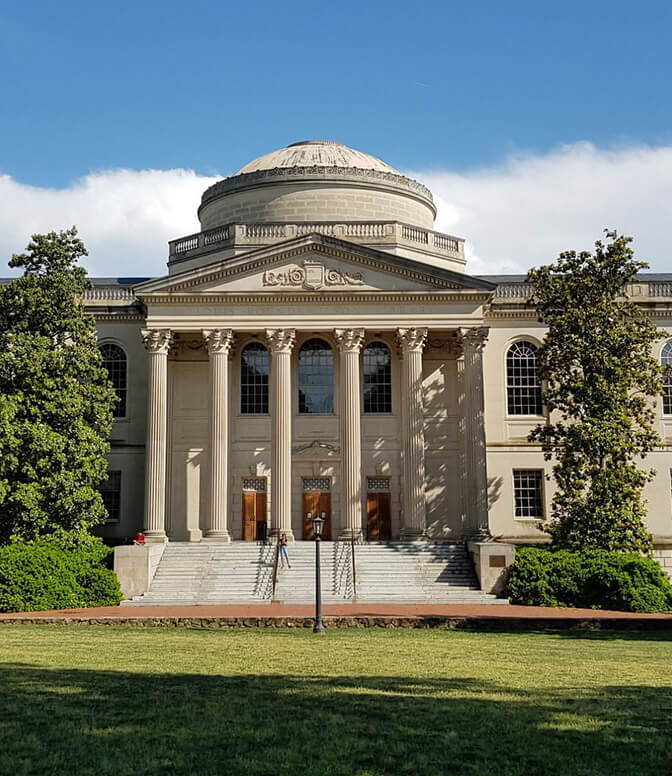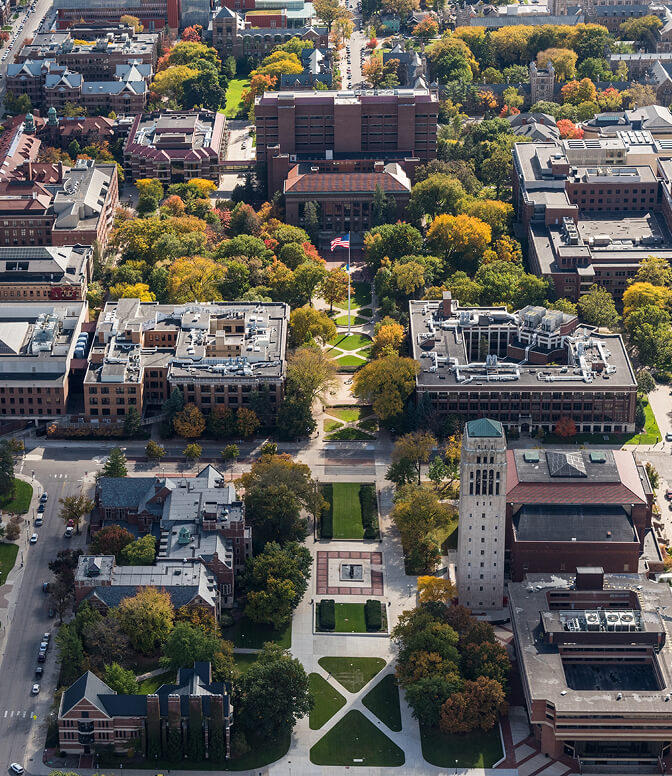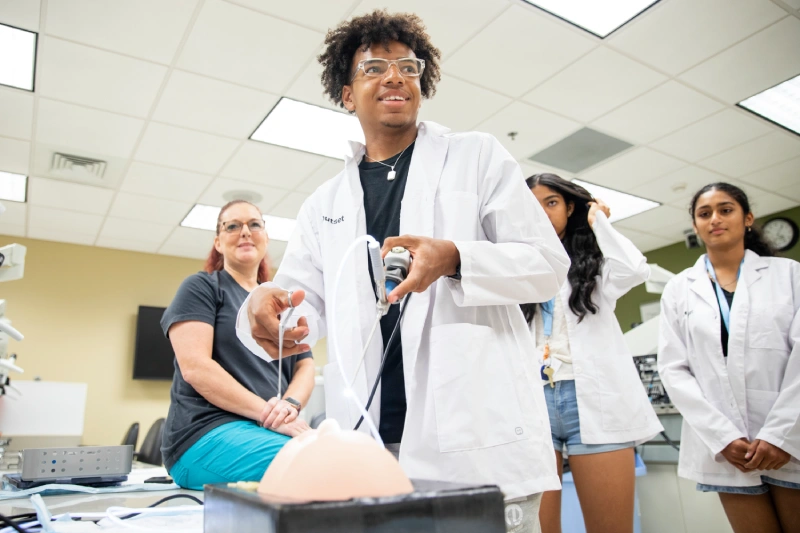Fascinated by the science behind medicine? Want to drive groundbreaking discoveries? If you're a teen wondering how to become a medical scientist, this guide is for you! A career as a medical scientist might be perfect for you. These professionals research diseases, develop treatments, and push medical boundaries every day.
With a constant demand for new medications and advanced therapies, learning how to become a medical scientist can lead you to make a real impact. Whether you dream of curing diseases or improving public health, medical science puts you right at the cutting edge.
Ready to explore the world of medical research? Let's discover how you can become a medical scientist!
What Does a Medical Scientist Do?
Medical scientists conduct research to improve human health and advance our understanding of diseases, treatments, and prevention methods. They design and execute experiments, collect and analyze data, and draw conclusions that help develop new medical knowledge.
A significant part of a medical scientist's work involves developing and testing treatments, medications, and medical devices. They establish protocols for clinical trials, monitor patient responses, and refine approaches based on results. This process requires meticulous attention to detail and adherence to strict ethical guidelines.
Medical scientists work across numerous specialized fields, including genetics, where they study the role of genes in diseases; infectious diseases, where they investigate pathogens and develop vaccines; and public health, where they analyze health trends across populations to inform policy decisions.
While primarily laboratory-based, many medical scientists also collaborate with physicians and other healthcare professionals to translate research findings into practical applications that directly benefit patients.
Education and Training Requirements: How to Become a Medical Scientist
Becoming a medical scientist requires a comprehensive educational journey that typically begins with undergraduate studies and continues through advanced graduate degrees. Most medical scientists hold either a Ph.D. in biomedical sciences or an MD-PhD combined degree, depending on their specific career goals.
For your undergraduate studies, you should focus on obtaining a bachelor's degree in biology, chemistry, pre-medicine, or another related scientific field. During this time, maintaining a high GPA (competitive applicants typically have around 3.8) is essential, as graduate and medical school programs admissions are highly competitive. Additionally, participation in research projects during your undergraduate years can significantly strengthen your applications for advanced programs.
After completing your bachelor's degree, you'll need to pursue either a Ph.D. in biomedical sciences or an MD-PhD combined program. If you're interested in conducting clinical research or working directly with patients, an MD-PhD program might be the better option. For these programs, you'll need to take the Medical College Admission Test (MCAT), typically during your junior year of undergraduate studies.
Ph.D. programs in biomedical sciences generally take 5-6 years to complete and include coursework, laboratory rotations, and original research culminating in a dissertation. MD-PhD programs are typically longer, taking 7-8 years to complete, as they combine full medical school training with graduate research.
Following graduate education, many medical scientists complete postdoctoral fellowships lasting 2-3 years to gain specialized research experience. Those with medical degrees must also complete residency training in their chosen specialty, which can take an additional 3-7 years depending on the field.
If you're considering an MD-PhD program, organizations like the American Physician Scientists Association (APSA) offer insights into this career path and resources for aspiring physician-scientists.
How Long Does It Take to Become a Medical Scientist?
Becoming a medical scientist requires significant educational investment and training across multiple stages. The journey typically takes between 6-16 years depending on your specific career path and specialization choices.
Undergraduate Studies (4 years)
Your journey begins with a bachelor's degree, typically in biology, chemistry, pre-medicine, or another scientific field. During these four years, you'll need to:
- Complete foundational coursework in sciences and mathematics
- Maintain a competitive GPA (the average for medical school applicants is around 3.8)
- Gain practical experience through internships or research opportunities
- Prepare for graduate or medical school entrance exams
Graduate or Medical School (2-8 years)
The next phase varies significantly depending on your chosen path:
- Medical Degree (MD or DO): 4 years of medical school
- Ph.D. in a scientific discipline: 4-6 years
- Combined MD/Ph.D. programs: 7-8 years
During this time, you'll transition from classroom learning to specialized training and research. If pursuing a medical degree, you'll complete clinical rotations in various specialties to gain practical experience.
Postdoctoral Research Training (Optional)
Many medical scientists complete 2-4 years of postdoctoral fellowship training. This optional but valuable phase allows you to:
- Conduct independent research under mentorship
- Develop specialized expertise in your field
- Build your publication record
- Establish professional connections
- Prepare for faculty or industry positions
If you're pursuing a clinical research path, you might also complete a medical residency (3-5 years) and potentially a clinical fellowship (2-3 years) for further specialization.
The extensive training period reflects the depth of knowledge and specialized skills required to advance medical science and improve patient care through research and clinical practice.
Skills and Qualities Needed to Become a Successful Medical Scientist
To excel as a medical scientist, you need to develop a specific set of skills and qualities that will serve as the foundation for your research work. Analytical thinking stands at the forefront of these skills, as you'll constantly evaluate research data, interpret results, and form hypotheses based on scientific evidence. This analytical mindset develops gradually through your educational journey, particularly in advanced science courses and research methods training.
Equally important is attention to detail. When conducting laboratory experiments or clinical trials, even minor oversights can compromise results. This meticulous approach extends to documenting procedures, recording observations, and maintaining research integrity. As you progress through your education, laboratory courses and research practicums will help sharpen this essential skill.
Problem-solving abilities are critical in medical science, where you'll encounter unexpected results and technical challenges. The ability to troubleshoot experiments, adjust research protocols, and think creatively about scientific questions develops through hands-on laboratory experience and collaborative research projects during undergraduate and graduate studies.
Proficiency in laboratory techniques forms the practical backbone of medical scientific work. You'll need to master various research methodologies, from cell culture and PCR to advanced imaging techniques. These technical skills build progressively through laboratory coursework and, more importantly, through immersive research experiences under experienced mentors.
Finally, strong communication skills enable you to share findings effectively with both scientific colleagues and the general public. You'll need to write grant proposals, research papers, and present at conferences. These communication abilities develop through scientific writing courses, presentation opportunities, and collaborative research that requires clear exchange of ideas and results.
The Association of American Medical Colleges (AAMC) defines crucial competencies that prepare medical students for success in school and their careers as physicians. Their premed competency model offers a structured guide, helping students build the skills and knowledge necessary for medical education and a career in cardiology.
Average Medical Scientist Salary
Medical scientists enjoy competitive compensation in today's healthcare landscape, with salaries varying based on experience, education, specialization, and geographic location. The field offers strong financial prospects, particularly for those with advanced degrees and specialized expertise in areas like oncology research.
According to BLS, the median annual salary for medical scientists was $100,890 in May 2023, with the lowest 10% earning less than $61,810 and the highest 10% earning more than $168,020. Salary.com reports a narrower range, estimating that salaries typically fall between $87,945 and $124,402, depending on factors like experience, location, and specialization.
Beyond the base salary, many medical scientists receive additional benefits including research funding opportunities, conference attendance stipends, publication bonuses, and comprehensive healthcare packages. These supplementary benefits often enhance the overall compensation significantly.
The demand for qualified medical scientists continues to grow at 11%, especially in biotech, pharmaceuticals, and healthcare research. This increasing need is driven by several factors, including ongoing cancer research initiatives, the development of novel targeted therapies, and expanding precision medicine approaches.
Career advancement opportunities abound for medical scientists who demonstrate research excellence and publication success. Many progress from research positions to leadership roles overseeing entire research departments or programs. Others leverage their expertise to secure positions in pharmaceutical companies, biotechnology firms, or academic institutions where they can lead high-impact research initiatives.
For those interested in both research and patient care, clinical researcher positions offer a pathway to apply scientific discoveries directly to improving patient outcomes while maintaining competitive compensation.
Challenges and Rewards of the Profession
A career in medical science isn't always smooth sailing. The field demands long research hours and dedication to staying current with fast-changing treatments and technologies. Scientists often struggle to secure funding for their work, especially in academic settings. The complex problem-solving needed to investigate diseases and develop treatments can be mentally exhausting when standard approaches hit dead ends.
Perhaps the toughest challenge is the emotional weight of working with serious diseases. Studies indicate that practicing biomedical scientists experience high levels of client-related burnout, with younger professionals at greater risk than their more experienced colleagues. Facing research setbacks while witnessing suffering requires serious emotional resilience.
But the rewards? They're profound. Nothing compares to making a real difference in patients' lives. Successfully developing a treatment or adding to medical knowledge brings immense satisfaction. The field offers intellectual stimulation through cutting-edge science and solving complex medical puzzles.
The profession provides stability and competitive pay, with medical scientists earning substantial annual salaries. Beyond money, many find deep fulfillment in advancing science and potentially helping countless patients through their discoveries.
Alternative or Related Careers
If medical science interests you but you want to explore options, several rewarding careers in related fields let you contribute to healthcare differently:
- Biomedical Engineer – Design and develop medical equipment, devices, and software used in diagnosis and treatment, including imaging technologies and therapy systems.
- Epidemiologist – Study patterns and causes of disease in populations, identify risk factors, and help develop public health strategies for prevention.
- Clinical Researcher – Design and conduct clinical trials to test new treatments, collect and analyze data, and help bring innovative therapies to patients.
- Biochemist – Study the chemical processes and substances in living organisms, potentially developing treatments that target disease at the molecular level.
- Pharmaceutical Scientist – Discover, develop, and improve drugs and treatment protocols, working on everything from initial compound discovery to formulation development.
- Medical Registrar – Collect, maintain, and analyze patient data to support research, public health planning, and improve patient care.
- Genetic Counselor – Help individuals and families understand and adapt to the medical and psychological implications of genetic contributions to disease.
- Medical Physicist – Ensure the safe and effective delivery of radiation therapy for treatment through precise calculations and quality control.
Many of these careers allow for specialization in specific research areas, providing opportunities to make meaningful contributions to healthcare without pursuing the exact same path.
Steps for Teens: How to Become a Medical Scientist
If you're a teen interested in pursuing a career as a medical scientist, there are several important steps you can take now to build a strong foundation. Here's how to get started:
- Excel in science and mathematics courses – Focus on biology, chemistry, physics, and advanced math classes. Take AP or honors courses if available at your school.
- Join science clubs and competitions – Participate in science olympiads, math competitions, pre-med clubs (you can also create one!) or science fairs to develop your research and analytical skills.
- Volunteer at hospitals or research centers – Gain firsthand experience by volunteering in healthcare settings to understand medical environments.
- Look for lab opportunities – Reach out to local universities or research institutions to inquire about shadowing scientists or assisting with basic lab work. Additionally, consider high school programs that offer medical training and exposure to research environments.
- Apply for summer research programs – Many institutions like the National Cancer Institute, Fred Hutchinson Cancer Center, and Memorial Sloan Kettering offer pre-med summer programs specifically for high school students.
- Develop strong communication skills – Join debate clubs or public speaking events to build your ability to explain complex concepts clearly.
- Read scientific journals and publications – Stay informed about current research and developments in medical science.
- Connect with mentors – Seek guidance from teachers, professors, or working scientists who can provide advice and potentially write recommendation letters.
- Create independent research projects – Design and conduct your own experiments to demonstrate initiative and problem-solving abilities.
- Build a strong academic record – Maintain a high GPA to be competitive for college admissions in pre-med or science programs.
Explore a Medical Science Career with Outset
Ever wondered what it's like to be a medical scientist? Get a glimpse into the pre-med lifestyle with Outset's hands-on experiences in medical research, allowing you to explore specialties. You'll observe real research in action, interact with experts, and gain valuable insights into this innovative field. Interested? Apply now on our website!
Final Thoughts
A career in medical science gives you the chance to make a profound difference in patients' lives while doing intellectually stimulating work. Yes, the path is demanding—but the rewards are incredible. From developing life-saving treatments to supporting patients through difficult health journeys, few careers offer such meaningful impact.
Start exploring by seeking out research opportunities, volunteering, or connecting with mentors in areas that interest you. Curiosity and persistence will be your best allies. As you move through your education, remain open to discovering which subspecialty speaks to your passion.
The medical field needs bright, dedicated minds like yours. Take that first step today and let your scientific curiosity guide you forward.
Resources and References
American Physician Scientists Association (APSA)














.png)








